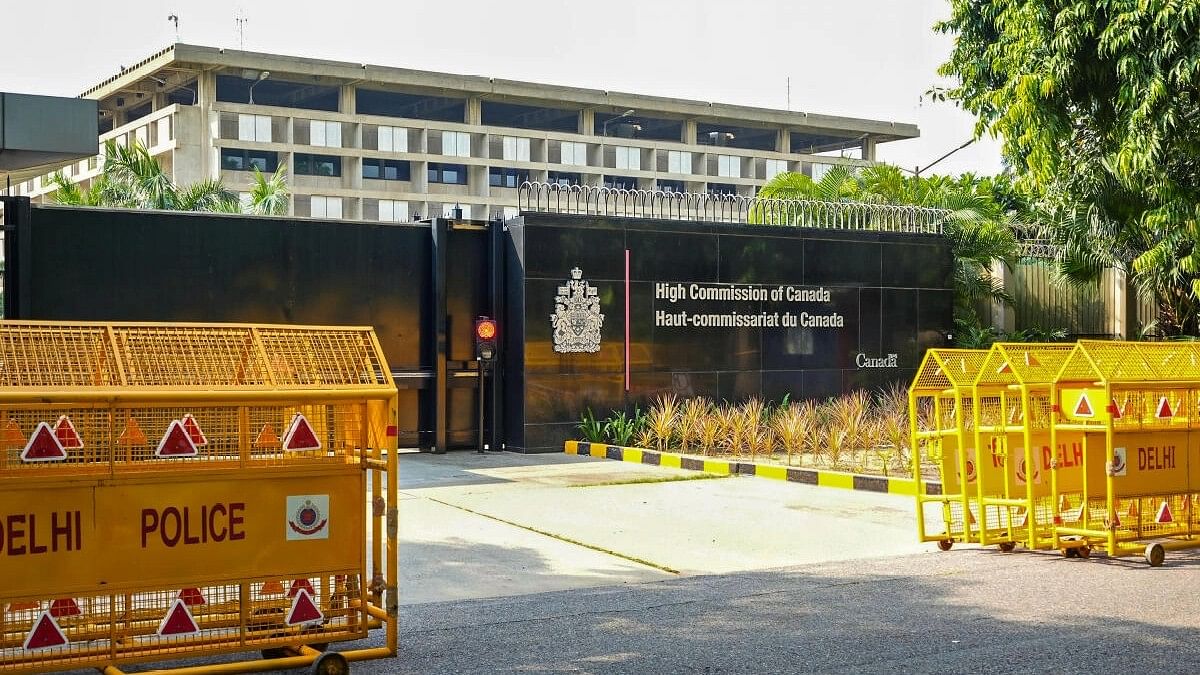
High Commission of Canada in India, at Shantipath in New Delhi.
Credit: PTI Photo
The diplomatic row between New Delhi and Ottawa escalated on Thursday, with Prime Minister Narendra Modi’s government deciding to pause issuing visas to citizens of Canada and asked the North American nation to downsize its diplomatic and consular mission in India.
New Delhi also called Canada “a safe haven for terrorists” – a term India earlier used only for Pakistan.
India suspended its visa-issuing services for citizens of Canada, citing security threats posed to its High Commission in Ottawa and consulates in Toronto and Vancouver. Canada too alleged that the members of its diplomatic and consular staff in India were receiving threats on social media platforms.
India also asked Canada to bring down the number of staff in its high commission in New Delhi and the consulates in Bengaluru, Mumbai and Chandigarh. The move is intended to bring parity between Canada’s diplomats and consular officials in India and India’s in Canada.
“Their numbers here are very much higher than ours in Canada…I assume there will be a reduction,” Arindam Bagchi, the spokesperson of the Ministry of External Affairs (MEA), said.
“In light of the current environment, where tensions have heightened, we are taking action to ensure the safety of our diplomats,” the High Commission of Canada in New Delhi said in a statement. “As a result, and out of an abundance of caution, we have decided to temporarily adjust staff presence in India.”
The relations between the two nations were on a free fall after Ottawa lent credence to the allegation of the extremist organization Sikhs for Justice about New Delhi’s role in the killing of the ‘Khalistan Tiger Force’ commander Hardeep Singh Nijjar in Canada. The two sides expelled each other’s diplomats on Tuesday and issued tit-for-tat travel advisories on Wednesday.
The negotiations between the two nations for a trade agreement were also suspended just days before Canadian Prime Minister Justin Trudeau claimed that his government’s security agencies were actively pursuing the ‘credible allegations’ about ‘a potential link’ between India’s agents and the killing of a citizen of Canada at Surrey in the British Columbia province of his country.
Nijjar, who was killed on June 18, was the commander of the Khalistan Tiger Force and one of India’s most wanted fugitive extremists. He has been living in Canada since the late 1990s and has been involved in running the campaign for the secession of Khalistan from India.
“We are willing to look at any specific information that is provided to us (in connection to the case), but so far we have received no specific information from Canada,” Bagchi, the spokesperson of the MEA, said. He was replying to a question on whether India would join the investigation Canada launched into the case.
The United States asked India to “participate and cooperate” with the investigation launched by Canada. Australia and the United Kingdom also stressed the importance of concluding the investigation.
New Delhi already rejected Ottawa’s allegations as ‘absurd’, ‘motivated’ and ‘unsubstantiated’.
Bagchi said that New Delhi had over the years asked Ottawa to either act against or extradite about 20-25 Khalistani extremists from Canada to India, but the response had not been helpful at all.
“If you're talking about reputational issues and reputational damage, if there is any country that needs to look at this, I think it is Canada and its growing reputation as a place, as a safe haven for terrorists, for extremists, and for organised crime.
And I think that's a country that needs to worry about its international reputation,” he said. “Safe haven is being provided in Canada. We want the Canadian government to not do so. It should either take action against those facing terrorism charges or send them to India to face justice.”
“You are aware of the security threats being faced by our high commission and consulates in Canada. It has disrupted their normal functioning. Accordingly, our high commission and the consulates are temporarily unable to process visa applications,” the MEA spokesperson said, adding that the situation would be reviewed regularly.
He added that Canadians with valid visas and documents like Overseas Citizenship of India cards would be allowed to travel to India.
Ottawa also asked New Delhi to ensure the security of Canada’s diplomats and consular officials in India, in accordance with the Vienna Conventions.
“We take our obligations of Vienna convention very seriously. We will be certainly providing all security to foreign diplomats in India. We also expect Canadian authorities to show similar sensitivity to our diplomats in Canada,” Bagchi said reacting to the demand for security from the High Commission of Canada in New Delhi.
